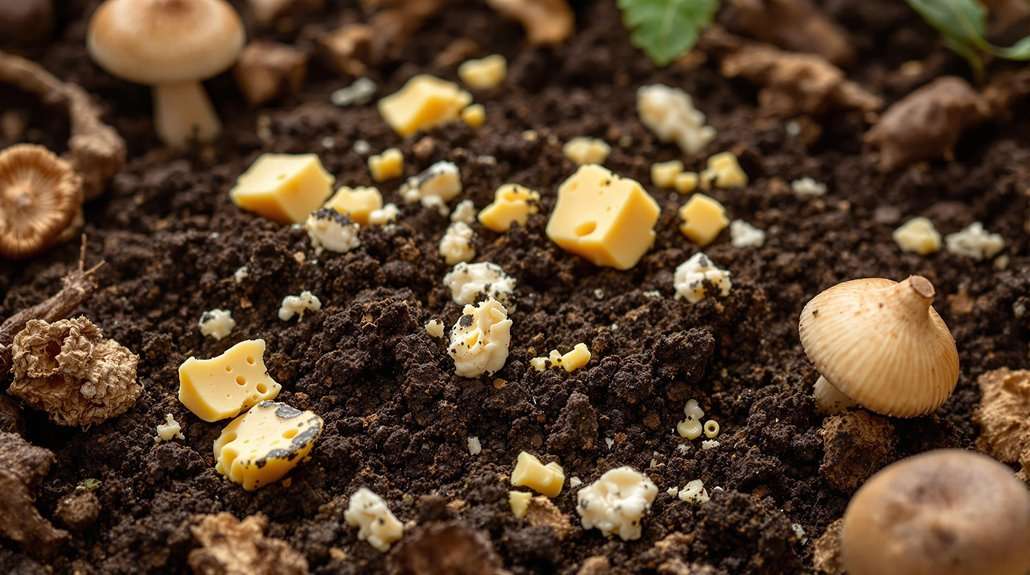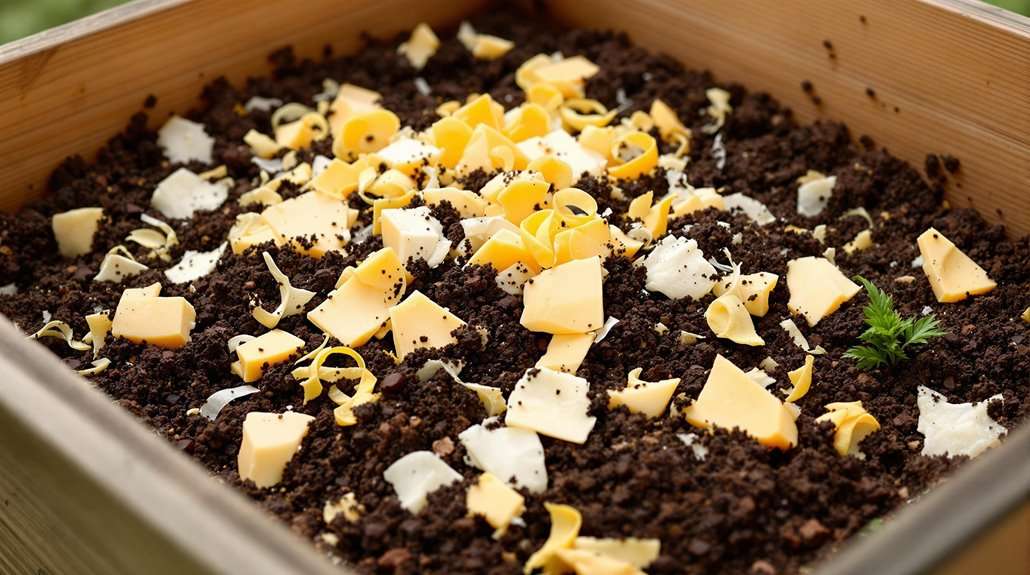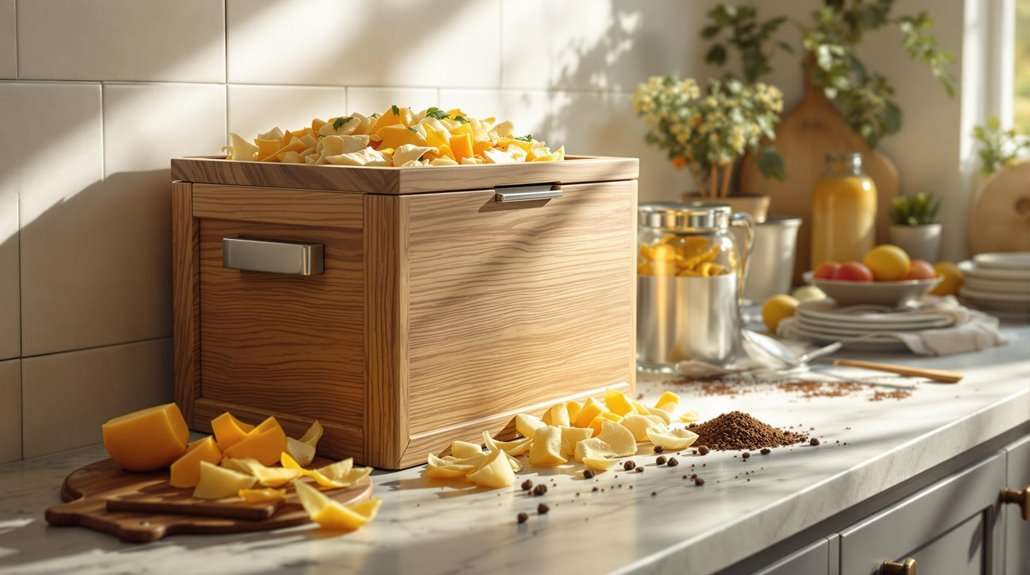Can You Compost Cheese
You can compost cheese, but it requires specific techniques to do it successfully. The key is maintaining a proper carbon-to-nitrogen ratio of 25-30:1 by surrounding cheese with carbon-rich materials like dried leaves or straw. For best results, break cheese into small pieces and bury it deep within your compost pile, while keeping temperatures between 90-140°F. Hard cheeses decompose slowly, while soft varieties break down faster. You'll need to monitor moisture levels and turn the pile regularly to prevent odors and pest problems. A closed composting bin or hot composting method will give you the most effective results.
This post may contain affiliate links. If you make a purchase through these links, I may earn a commission at no additional cost to you. Additionally, portions of this post may be generated using artificial intelligence (AI) technology. While we strive for accuracy, please be aware that AI-generated content may not always be perfect and should be fact-checked when necessary.
The Spatula Scoops
- Yes, cheese can be composted, but it requires careful management to prevent odors and pest attraction.
- Hard cheeses decompose slowly while soft cheeses break down faster, with both needing proper carbon-rich material ratios.
- Bury cheese deep within compost piles and maintain a 25-30:1 carbon-to-nitrogen ratio for successful decomposition.
- Use closed composting bins to control odors and prevent pests from being attracted to the cheese.
- Grate or chop cheese into smaller pieces and mix thoroughly with brown materials to speed up decomposition.
The Science Behind Cheese Composting

Most people don't realize that composting cheese requires a careful balance of scientific principles. When you're composting cheese, you're actually managing a complex ecosystem of microorganisms that break down dairy proteins and fats into nutrient-rich compost.
The decomposition process relies heavily on maintaining the right balance of carbon to nitrogen, specifically a ratio of 25-30:1. You'll need to surround your cheese with carbon-rich materials like dried leaves or straw to achieve this balance. Temperature control is equally important, as your compost pile should maintain 90-140 degrees Fahrenheit to support ideal microbial activity. Industrial composting facilities can handle cheese waste more efficiently than home composting due to their ability to maintain these high temperatures consistently.
The science becomes even more intricate when you consider moisture management. Cheese's high fat content can create water-resistant barriers that slow decomposition, while excessive moisture can lead to anaerobic conditions. You'll need to monitor these factors carefully and adjust by adding dry materials or turning the pile regularly. The size of your compost bin also affects the process, as larger volumes generate more heat through microbial activity, which accelerates decomposition and helps maintain the necessary temperature range for effective breakdown.
Best Types of Cheese
Understanding the science behind composting cheese sets the stage for selecting the right varieties for your compost pile. When you're choosing cheese for composting, hard varieties like cheddar offer slower decomposition rates, while soft cheeses like brie break down more quickly but require careful management to avoid pest issues. Closed composting bins are essential for preventing unwanted pests and controlling odors during the decomposition process. Maintaining a consistent moisture level, similar to the importance of air fryer temperature control, is crucial for efficient decomposition.
You'll find that vegan cheese is often your best option for composting, as its lower fat content makes it easier to process. If you're working with traditional dairy cheese, you'll want to grate or chop it into smaller pieces to increase the surface area for decomposition. When adding cheese to your pile, remember to balance it with carbon-rich materials like dried leaves or shredded paper.
For the most effective composting results, you'll want to avoid processed cheese products due to their high preservative content. Instead, focus on natural cheeses, and consider using an electric composter or bokashi system if you're dealing with larger quantities. While moldy cheese is acceptable for composting, you'll need to treat it similarly to soft cheese, ensuring proper moisture control and aeration to prevent anaerobic conditions in your pile.
Tips For Successful Composting

Success in composting cheese depends on several key practices that prevent common pitfalls. You'll need to start by removing all non-biodegradable packaging and breaking the cheese into smaller pieces through chopping or grating. This preparation step is vital for faster decomposition and prevents large chunks from creating anaerobic pockets in your pile. Modern systems like the Subpod composting system offer an effective solution for processing cheese while preventing odors and pests.
To maintain ideal conditions, you'll want to bury your cheese deep within the compost pile and mix it thoroughly with carbon-rich materials like dried leaves or sawdust. Remember to maintain a ratio of 25-30 parts brown materials to 1 part green materials, which helps balance the decomposition process. You'll also need to monitor moisture levels carefully, as cheese can create excess liquid that leads to unpleasant odors.
Regular pile turning is essential for proper aeration, and you should check the temperature frequently to guarantee healthy microbial activity. If you notice any strong odors or excessive moisture, add more brown materials immediately. While hot composting methods work best for cheese, you'll want to avoid vermicomposting, as worms typically don't process dairy products well.
Common Challenges and Solutions
While composting cheese offers valuable benefits, several common challenges can impact the process. You'll need to be aware of these issues and implement proper solutions to maintain a healthy compost pile. The high fat content and dense structure of cheese can create specific obstacles that require careful management and monitoring. Breaking cheese into smaller pieces will significantly improve decomposition rates and help manage odors.
Here are the main challenges you'll encounter when composting cheese, along with their solutions:
- Pest attraction: Combat unwanted visitors by incorporating plenty of dry materials and turning your pile regularly, or use an electric composter to minimize pest access
- Unpleasant odors: Balance green and brown materials while ensuring proper aeration through regular turning to prevent anaerobic conditions
- Slow decomposition rates: Speed up the process by using hot composting methods or bokashi systems, which are particularly effective for breaking down dairy products
- Disease concerns: Maintain high temperatures in your compost pile and monitor the carbon-to-nitrogen ratio to effectively kill pathogens and prevent the spread of harmful organisms
Methods That Actually Work

Now that you're aware of the challenges, let's focus on the proven methods for composting cheese effectively. You'll find success with four main approaches: hot composting, bokashi, electric composting, and vermicomposting, each offering distinct advantages for breaking down dairy waste. Regular turning and aeration of your compost pile helps prevent bad odors from developing.
Hot composting works well when you maintain temperatures between 90-140°F and bury cheese deep within your pile. You'll need to chop or grate the cheese first and mix it thoroughly with carbon-rich materials like dried leaves and shredded cardboard. For a more controlled process, bokashi composting uses beneficial microorganisms to ferment cheese in an airtight container, typically completing in about a month. If you're tech-savvy, electric composters offer a convenient solution, breaking down cheese quickly while maintaining ideal conditions to prevent odors. While vermicomposting isn't typically recommended for dairy, you can introduce small amounts of cheese gradually if you're careful to monitor your worms' response and maintain proper bedding conditions. Whichever method you choose, remember to balance your cheese with plenty of carbon-rich materials and maintain appropriate moisture levels for ideal decomposition.
Frequently Asked Questions
How Long Does Cheese Take to Fully Decompose in a Compost Bin?
You'll find that cheese decomposition time varies based on several factors. In hot compost piles (130°F-160°F), cheese can break down within 2-3 weeks, while cooler conditions extend this to 2-4 months. Soft cheeses decompose faster than hard varieties. You'll speed up the process by grating or chopping the cheese, maintaining proper moisture levels, and regularly turning your pile.
Can Moldy Cheese Be Added to the Compost Pile?
Yes, you can add moldy cheese to your compost pile, as it's already in a state of decomposition. You'll want to break it into smaller pieces and mix it with plenty of brown materials, like dried leaves or paper, to balance moisture levels. Keep the amounts small to prevent odors and pest problems. For best results, use hot composting methods and turn your pile regularly to maintain proper aeration.
Does Composting Cheese Affect the Ph Balance of the Final Compost?
Yes, cheese can affect your compost's pH balance due to its high fat content and potential for anaerobic decomposition, which may create acidic conditions. You'll need to maintain a proper carbon-to-nitrogen ratio (25:1 to 30:1) by adding plenty of brown materials like leaves or straw to neutralize any pH imbalances. Hot composting and regular turning will help prevent acidic conditions while ensuring proper breakdown of the cheese.
Should Cheese Rinds Be Removed Before Adding to Compost?
While you might think removing cheese rinds is necessary, you don't actually need to take this extra step. You'll get better results by keeping the rinds attached, as they contain beneficial microorganisms and nutrients for your compost. Instead of removal, focus on chopping the cheese with its rind into smaller pieces, mixing it thoroughly with brown materials like dried leaves, and burying it deep in your pile.
Can Cheese-Based Sauces and Dips Be Composted Alongside Regular Cheese?
You can compost cheese-based sauces and dips alongside regular cheese, but you'll need to take extra precautions. These sauces typically contain higher moisture content, which requires more carbon-rich materials for balance. Mix them thoroughly with brown materials like leaves or paper, and use smaller portions to prevent overwhelming your pile. Their liquid consistency actually helps them break down faster than solid cheese, but they're more likely to create odor issues if not managed properly.





